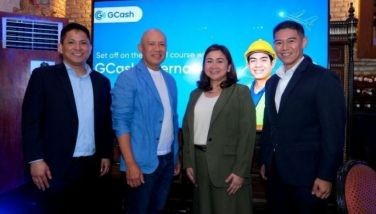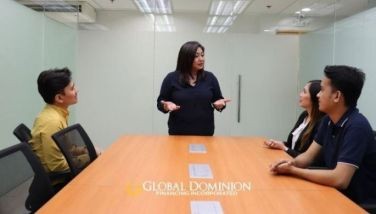BCDA chief Casanova: Poverty not an obstacle to success
MANILA, Philippines - Having grown up in a rather outback town of Padre Garcia in Batangas, Arnel Paciano Casanova, 43, is no stranger to the high road which he took toward personal triumph. Currently the president and chief executive officer of state-run Bases Conversion and Development Authority (BCDA), Casanova, who is also a prominent lawyer, never lost sight of his objectives, both as a young man still dreaming of a brighter tomorrow and as a top honcho in the corporate world.
“I have no regrets being born in a poor family. I even think it was a blessing because it made me stronger, and I looked at challenges as opportunities to improve myself and inspire others to do the same. When I was younger, I often wondered why things are the way; other things why they were not supposed to be. Nonetheless, the problems and difficulties also taught me to be compassionate with the less fortunate, more so with those who seemed unable to help themselves because I realized I wasn’t that unlucky, after all,†Casanova recalled.
Thus, both his successes and failures never changed Casanova’s outlook in life.
For his family, he was ever the loving husband and doting father of two teenage boys; the bond that holds them together gets stronger with every passing day.
As incumbent head of a large government-owned corporation, Arnel knew he has large shoes to fill. He is aware that he must keep alive the torch that he inherited from his predecessors so that the BCDA would accomplish its mission of delivering economic growth and prosperity to the countryside.
As BCDA skipper, he must always be on top of the situation, efficiently steering the ship of affairs as it negotiates unchartered course fraught with legal and administrative challenges that must be weathered at all costs.
However, Casanova’s excellent academic background served him in good stead. Having earned degrees in Law and Public Administration, as well as post-graduate studies in English and Urban Planning, Casanova effectively proved he was worthy of the tasks assigned to him in various capacities.
Among the salient points in his curriculum vitae was his Master’s degree in Public Administration obtained from Harvard University’s Kennedy School of Government as a World Bank scholar.
For him, economic deprivation is not an obstacle in the pursuit of a person’s vision.
“The usual mindset is if you’re poor, then you’ll be wanting for the rest of your life because your opportunities to study and work are all limited, But I never believed in that mistaken notion,†Casanova said.
“You have to charter your own path. You should not allow other people to determine your own future,†he stressed.
He cited the case of University of the Philippines coed Kristel Tejada as an extremely painful lesson to learn by both the student and their parents in dealing with difficulties of accompanying education vis-à -vis the family’s financial situation. Kristel took her own life in utter desperation for being ostracized over her failure to cope with the financial burdens of her education.
“It was emotionally devastating. I could feel the pain she felt. I could only imagine how it is be rejected and denied you simply don’t have the money to see you through your schooling,†Casanova added.
“I’m starting a student lending program in the Center for Agriculture and Rural Development (CARD), a microfinance organization to poor but deserving students like Kristel,†he revealed.
On public service
Early in his career as a lawyer, Casanova had the chance to enjoy a lucrative job in the US. During his Harvard days, former Federal Reserve chair Paul Volcker offered him a job, but he declined and opted instead to go home and look for work at the home front.
Armed with excellent academic preparation, landing a job was virtually a walk in the park for the young man who worked his way through college doing odd jobs like splattering mayo on hamburger buns in a fast food shop.
He took over the reins of the BCDA two years after leaving the same company where he served as legal counsel for quite some time.
“I recognize that the BCDA is a very meaningful organization, and being at the driver’s seat, I could do a lot of things that can possibly be beneficial for the country,†he said.
He adheres to the Aquino administration’s thrust to tap public-private partnership (PPP) as a linchpin of national economic development.
After all, pursuing its legislatively ordained mission to create growth engines in collaboration with private business was not entirely new to the BCDA. Under its asset disposition program, idle and unproductive government lands were transformed into high-end commercial-industrial-residential centers through the PPP concept.
The Bonifacio Global City (BGC) is now a shining example of that program. Largely bankrolled by private partners, the erstwhile sprawling raw land within the military reservation then known as Fort Bonifacio straddling the boundaries of Makati City and Taguig City, a construction boom turned the area into what is now known as the BGC, a posh commercial-residential hub that gives adjacent Makati and Ortigas business centers a run for their money.
“We intend to create (more) business districts in different parts of the country where our properties are located. For us to progress economically, we have to create those urban centers,†he said.
More than just injecting life into the former US military facilities in Central and Northern Luzon, as well as Philippine base lands within Metro Manila, the BCDA ensures that these projects are being implemented under a platform of sustainable development.
Outside the BCDA, Casanova immerses in humanitarian endeavors consistent with his commitment to make a difference in the lives of the less fortunate.
Such extra-curricular activities involved micro-financing through CARD, good governance via Kaya Natin!, and social entrepreneurship education being pursued through his teaching job at the Ateneo de Manila University. “These are essential parts of who I am. Microfinance gives me an opportunity to help poor mothers and families in real time.â€
Social entrepreneurship as an avocation is rooted on his student in UP, reputedly a hot-bed of student activism in the country.
Casanova admits however, that “real activism is not in the shouting, it’s in the doing. “
“I see the need to do development work on a sustainable basis because gone are the days of charitable NGOs that help people through dole-outs and patronage which are merely palliatives. You have to empower people by realizing their capabilities,†he stressed.
To keep physically fit, Casanova trades punches with sparring mates, jogs, or joins marathons and decathlons.
Asked about his vision for the near and distant future, Casanova said: “I just want to continue building more cities and infrastructures and making life for Filipinos better. I want to be able to contribute… I just want to do whatever God wanted me to do.â€
- Latest






























